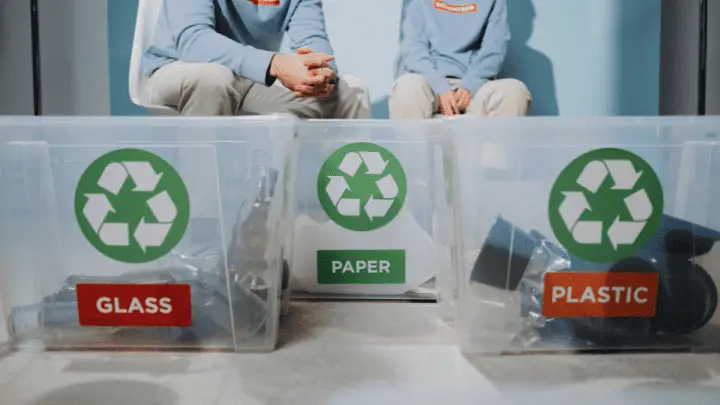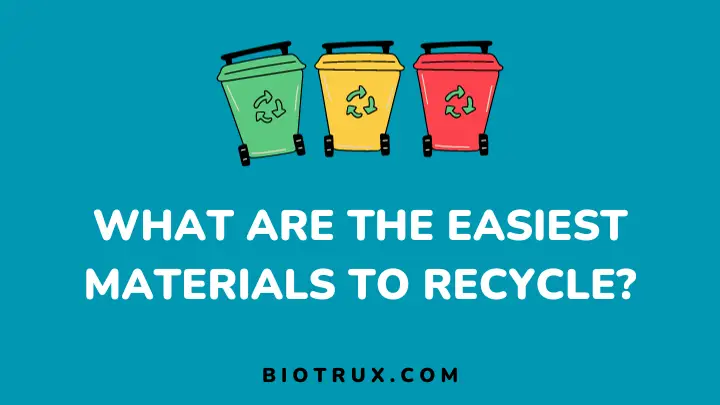Recycling is not just a trend; it’s a responsibility. It significantly contributes to environmental conservation and resource management. But what are the easiest materials to recycle? With so many materials out there, it can be challenging to know where to start.
That’s why, in this article, you will explore the easiest materials to recycle. By recycling these materials, we can significantly reduce the amount of waste in landfills and oceans.
I’ll also discuss why recycling is essential and how you can contribute to effective recycling. So, sit back, and let’s dive in to discover the easiest materials to recycle and how we can make a difference together.
1. Paper and CardBoard
Paper and cardboard are highly versatile materials used for various purposes, from writing and printing to packaging and crafting. Additionally, it is one of the easiest materials to recycle, reducing waste and conserving resources.
Why is it important to recycle paper?
- Reducing deforestation and conserving trees: When we recycle paper, we reduce the demand for fresh paper production, ultimately leading to fewer trees being cut down. It’s a crucial step in preserving our forests and the wildlife that calls them home.
- Saving energy and water resources: Recycling paper or cardboard consumes significantly less energy and water than producing new paper from raw materials. It’s a double win for conserving natural resources.
Overview of the recycling process
- Sorting and collection methods: Start by sorting your paper waste. Common recyclables include newspapers, magazines, office paper, and cardboard. Collection methods vary by location, so check your local recycling program for guidelines.
- Paper recycling process: Once collected, paper is cleaned, de-inked, and processed into pulp. This pulp is then used to create new paper products.
2. Glass
Recycling glass is vital to reduce energy consumption and minimize waste in landfills. Glass is 100% recyclable, and you can easily recycle it by depositing glass containers in recycling bins.
Why is it important to recycle glass?
- Infinite recyclability and resource conservation: Glass is endlessly recyclable without losing quality. This property makes it a champion in resource conservation, reducing the need for new raw materials.
- Reduction in energy consumption: The energy required to melt recycled glass is much lower than that needed for raw materials, leading to significant energy savings.
Overview of the recycling process
- Collection and sorting of glass: Glass containers like bottles and jars are typically collected in recycling programs. Sorting involves separating glass by color to maintain the purity of recycled material.
- Glass recycling process: Collected glass is cleaned, melted, and molded into new glass products. This closed-loop system is a sustainability win.
3. Aluminum
Aluminum cans are one of the easiest to recycle because they can be melted down and reused indefinitely without losing quality. Additionally, they save a significant amount of energy during production.
Why is it important to recycle aluminum?
- High market demand: Aluminum has a high market value because it is a versatile metal used in various industries, including aerospace, automotive, construction, and packaging. It is also lightweight, durable, and corrosion-resistant, making it a preferred material for many applications.
- Dramatic energy savings: Recycling aluminum is highly efficient, with up to 95% energy savings compared to primary production. This is because the process of extracting aluminum from bauxite ore is energy-intensive. So, recycling cans helps to conserve resources and reduce greenhouse gas emissions.
Overview of the recycling process
- Collection of aluminum products: Aluminum cans, foils, and other products are collected through recycling programs and facilities.
- Aluminum recycling process: The collected aluminum is melted, refined, and used to create new aluminum products, including beverage cans and car parts.
4. Steel
Steel is one of the easiest materials to recycle because it is highly versatile and durable. It can be melted down and reshaped into new products repeatedly without losing its strength or quality.
Furthermore, steel is widely used in various industries, making it a highly demanded material in the recycling market.
Why is it important to recycle steel?
- Retained strength and durability: Recycled steel maintains its strength and durability, making it valuable for construction and manufacturing industries.
- Energy and resource conservation: Recycling steel uses less energy and reduces the need for mining raw iron ore, preserving natural resources.
Overview of the recycling process
- Collection and sorting of steel products: Steel items like food cans and appliances are collected through recycling programs. These items are sorted and processed accordingly.
- Steel recycling process: The collected steel is melted down and shaped into new steel products, contributing to the circular economy.
5. Plastic Bottles
Plastic bottles are easy to recycle because they are usually made of a single type of plastic, which makes them easy to sort and process. Additionally, they are lightweight and take up less space compared to other recyclable materials like metals and glass.
Why is it important to recycle plastic bottles?
- Reducing plastic pollution and marine litter: Recycling plastic bottles helps combat plastic pollution in our oceans and waterways, protecting marine life and ecosystems.
- Saving petroleum resources: The production of new plastic from petroleum is resource-intensive. Recycling plastic bottles conserves these valuable resources.
Overview of the recycling process
- Sorting and preparation for recycling: Plastic bottles are first separated from other waste. Then, they are rinsed to remove any residual liquids or contaminants.
- Plastic bottle recycling process: Recycled plastic bottles are cleaned, melted, and used to create new plastic products, from bottles to clothing.
Are plastic bags easy to recycle?
Actually, plastic bags are not that easy to recycle. In fact, they are one of the most difficult materials to recycle. This is due to their thin and flexible nature, which makes them prone to getting tangled in the recycling machinery.
Additionally, plastic bags are made from low-density polyethylene, which is not highly valued in the recycling market. Therefore, it is recommended that we reduce our use of plastic bags and opt for more sustainable alternatives like reusable bags.
6. Clothing and Textiles
Clothing and textiles can be recycled, but the process is more complex than that of other materials like paper, glass, or aluminum. This is because clothing and textiles comprise various fibers and materials that require different recycling processes.
However, recycling clothing and textiles is still important and can significantly reduce waste and conserve resources. By recycling clothing and textiles, we can reduce the amount of waste in landfills, conserve energy, and minimize pollution.
Why is it important to recycle clothing and textiles?
- Reducing textile waste: The fashion industry generates substantial textile waste. Recycling clothing and textiles diverts these items from landfills.
- Supporting a circular fashion economy: Recycling textiles can lead to new clothing or repurposed fabric, supporting a more sustainable fashion industry.
Overview of the recycling process
- Donation: Donating clothes to charity, selling them to consignment shops, or swapping clothes with friends are all great ways to recycle clothing.
- Textile recycling process: Recycled textiles can be shredded and repurposed into new fabric or repurposed for various applications.
7. E-Waste
E-waste refers to electronic waste, which includes discarded electronic devices such as computers, cell phones, televisions, and other electronic gadgets.
These devices often contain hazardous materials like lead, mercury, and cadmium, which can harm the environment and human health if they are not disposed of properly.
However, electronic devices also contain valuable materials like copper, gold, and silver, which can be extracted and reused. By recycling e-waste, we can keep harmful materials out of landfills, conserve natural resources, and reduce greenhouse gas emissions.
Why is it important to recycle e-waste?
- Toxic material management: Electronic waste, or e-waste, often contains hazardous materials, as listed above. Proper recycling ensures these substances are managed safely.
- Resource recovery: Many components of electronic devices, such as precious metals and rare earth elements, can be recovered through recycling, reducing the need for new mining.
- Reuse production materials: Recycling e-waste helps to close the loop in the production cycle of electronic devices. Instead of extracting new raw materials to create new devices, recycled materials can be used, reducing the environmental impact and conserving natural resources.
Overview of the recycling process
- Electronic waste collection: E-waste recycling programs collect and responsibly dispose of electronic devices like old computers, smartphones, and appliances.
- E-waste recycling process: Devices are dismantled, and their components are separated for recycling or proper disposal of hazardous materials.
How to Recycle Effectively
Recycling is not only about what materials to recycle but also how to do it correctly. Here are some tips to ensure you recycle effectively:
- Know your local recycling program: Familiarize yourself with your local recycling program to understand which materials are accepted and how they should be sorted.
- Clean and sort: Ensure that recyclables are clean and sorted correctly. Contaminants can disrupt the recycling process.
- Reduce and reuse: Whenever possible, reduce your consumption and reuse items. Recycling should be the last resort.
- Support recycling initiatives: Support organizations and initiatives that promote recycling and environmental sustainability.

FAQs
Why is recycling important?
Recycling is vital for reducing the strain on our planet’s resources and minimizing waste. It conserves natural resources, saves energy, and helps protect the environment from pollution.
How does recycling save energy?
Recycling saves energy by reducing the energy required for extracting, processing, and manufacturing products from raw materials. It also helps decrease greenhouse gas emissions.
What can you do to recycle more effectively?
You can recycle more effectively by understanding your local recycling guidelines, sorting your recyclables properly, and ensuring they are clean and free from contaminants. Additionally, supporting products made from recycled materials encourages recycling practices.
What happens to recycled materials?
Recycled materials are processed and transformed into new products, reducing the need for raw materials.
Is recycling really effective in reducing waste?
Yes. Recycling significantly reduces waste in landfills, conserves resources, and helps protect the environment.
Can you recycle batteries at home?
It’s best to recycle batteries at designated collection points to ensure proper disposal and prevent environmental contamination.
Final Thoughts
As we come to the end of this article on the easiest materials to recycle, it’s critical to emphasize the critical importance of recycling in our lives. Recycling is more than a choice; it is a responsibility that each of us must accept for the greater good of our world.
There is a tremendous chance to have a big influence on environmental sustainability with the materials you have explored today, from electronics to paper. Recycling not only saves resources and energy, but it also decreases pollution and waste, leaving our planet cleaner and healthier for future generations.
But here’s the best part: recycling isn’t a solo venture. It’s a collaborative effort, and you’re an important part of it. You’re not simply making a decision when you recycle; you’re making a difference and inspiring others to do the same.
So, let’s commit to recycling not just today but every day. It’s a tiny effort with a significant impact. By working together, we can create a more sustainable and harmonious future for everyone.
Accept recycling, and together, we can make the world a better place, one recyclable item at a time. You can also learn more about how to properly dispose of Laptop batteries.
Thanks for reading.
